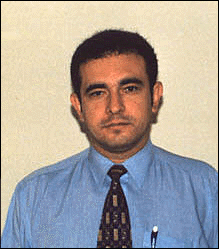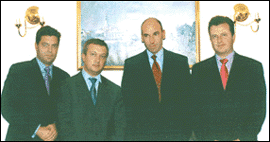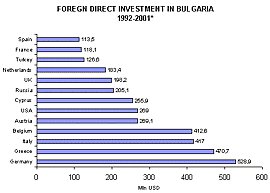 THE POLITICAL SENSITIVITIES OF PRIVATIZATION THE POLITICAL SENSITIVITIES OF PRIVATIZATION

Still, the cabinet faces specific problems in the sphere of providing incentives for the expansion of business, which have to be accounted for in any analysis of current developments.
For instance, one of the largest Bulgarian companies, representing a whole branch by itself, the tobacco manufacturer Bulgartabac, is a very politically sensitive industry.
"Bulgartabac is an industry all by itself", PA's Apostol Apostolov, said. "Bulgartabac is not simply the company. It gives food and jobs to hundreds of thousands people in this country.
If I as a manager of the Privatization Agency will have to sell the company to the buyer, and the buyer would like to restructure the company, he will probably have to fire 80% of the people. These people will have to go begging on the streets. This is not the way to privatize. About 50,000 or 60,000 people are at the tobacco farms, growing tobacco. We cannot be like other countries in the middle of Europe where they only import the tobacco and then only cut the cigarettes, because there is a demand in the country…" Apostolov went on to say. "In Bulgaria this is the typical agricultural product, so, restructuring, unemployment, liberalization of the prices are very sensitive issues. No government would be happy to learn that 50,000 people take to the streets on strike."


Most of the tobacco farmers who are directly dependent on the lifeline of Bulgartabac belong to some of the most sensitive ethnic minority groups in Bulgaria. At the same time, the capacities of Bulgartabac have obviously not been designed for domestic consumption. They were designed for export, mainly to the ex-Soviet Union. International tobacco majors have swarmed to Bulgaria with almost an exclusive objective to move on to Russia and the ex-Soviet states. Whoever takes over Bulgartabac, will have a production capacity, only by some accounts, ten times bigger than the needs of Bulgaria.
Privatizing Bulgartabac is not that simple. Political considerations must be taken into account. Anybody who does not focus on that is "either very ignorant about the importance of Bulgartabac, or has just not done their homework", Georgi Popov, Bulgartabac's CEO, said.
Bulgaria's transition to a market-oriented economy has its uncontested success stories. In 1992, a local brassware manufacturer, Vidima, started a joint venture with one of the largest companies in the World, "Vidima is unique in that the business has managed to retain its reputation for craftsmanship and quality throughout its 80-year history. "We found that partner in American Standard, one of the world's largest plumbing products manufacturers. At the time, American Standard was starting to expand its fittings business and was seeking strategic partners. In April 1992, the companies entered into a manufacturing joint venture with American Standard owning a slight majority - 51% to the state's 49%." Vassil Kanev, former head of the state-owned Vidima, now head of the American Standard operations in Bulgaria, said

"I think the most significant milestone in our history occurred in 1995 when American Standard licensed Vidima to produce fittings under its Ideal Standard brand. That was a vote of confidence in our ability. Throughout Europe, the Ideal Standard brand is synonymous with quality, style and innovative design. By licensing Vidima, American Standard was saying we had the talent and skills to produce to their high standards.
In 1997, American Standard began the construction of a plant in Sevlievo to manufacture ceramic bathroom products like sinks and toilets. Today, the plant is one of the company's largest in Europe. That same year, our fittings plant, also in Sevlievo, expanded its production capacity; and in May 2001, the company opened another plant in Sevlievo to manufacture door hardware. We've come a long way in nine years".
Learning how to do business is sometimes a difficult experience, according to Krassimir Dachev, head of the supervisory board of a local high-tech company, Metal Technology Group (MTG)

Dachev, a top-notch lawyer-turned-businessman, claims he is used to working against the local environment, against the government, against policy restraints. "And we get stronger, because we get opposition all the time. This is the reason why it is difficult for any single Bulgarian government to take steps against business, because all businesses have one permanent objective - to clean the Bulgarian industry. Nobody initially helped the Bulgarian industry after the changes. We have a very serious potential here. In the last 10 or 12 years however, the total volume of foreign investments was low and very soon we might lose those theoretical possibilities."
Metal Technology Group grew around the hub of a former research institute that developed a modern technology for high-precision counter-pressure casting. "Last year we made a DEM 136 million with products dedicated exclusively to export. Now it is going to be a little bit worse, because of the world crisis. We produce turbines for hydroelectric power plants and various types of heavy-duty metal pressing equipment. What we do is invest in heavy machine building and this is the industry which is usually first affected by the crisis. The orders from Europe have decreased by 50%. I will give you an example: last year we sold 365 presses for Europe. This year's orders until now are 148, which is less than 50%".


"Still, it is more attractive here than we could reasonably explain"; Dachev went on. We have been living a fantastic life here in the last years, because changes were made that could not be made by 10 generations. I am satisfied with the business that I am doing in Bulgaria. Having everything around you structured might be boring… Now it is going to be a little bit boring in Bulgaria, because things are slowly, slowly fitting one by one into their places. Can you imagine 7 years ago we were not able to know what would be the exchange rate tomorrow, what would happen tomorrow, what government would be in place tomorrow. You didn't know anything and you had to make decisions on the spot. Life is incredibly interesting, because when you go to sleep and wake up in the morning - the situation is completely different. You can't say "O.K. I will tell you tomorrow", because you don't know what will happen tomorrow. Every decision has to be taken now, immediately. Life is fantastic here for someone who is enjoying his work, and I enjoy my work."
Dachev was successful also in a seemingly different sector. "The last project, Svilosa, happened accidentally. This is a complex of different factories - for paper, viscose rayon, etc. The initial candidate for the privatization was one who was trading paper and not interested in other activities. He would close the activities that were not his expertise. We found the way with the establishment of a commercial entity, acting basically as an insurance company, and with the participation of all the clients and all the bigger suppliers. It was a successful project... In 2002 we will return all the money for the privatization. We have planned to double the total capacity of Svilosa - rayon, pulp, etc.", Dachev said.
The total volume of direct foreign investments made during the period of transition (1992 - June 2001) is estimated at USD 4,253 million. Of the whole, USD 1,448 million, or 34%, of the investments were made through privatization. The rest of the investments were made as "green-field projects" and as investments made in enterprises with foreign participation (USD 2,805 million).
Foreign investment over the next five years is expected to grow. A certain delay in privatization in 2001-2002 will slow down the influx of foreign capital as well, but the trend will be reversed after 2003, with annual direct foreign investments expected to top USD 1 billion. The positive prospects are motivated by a sustainable macro-economic stability, lower regional risks and by the general revival of economic activities after a 12-year buffer period of trimming all the ineffective venues of business. A rise in foreign investments could be expected also in line with an ambitious infrastructure program designed to turn Bulgaria into the energy and transportation hub of the Balkan region.
For the time being foreign investment remains the most powerful engine of economic growth and a major source for offsetting a persistent current account deficit. At the same time the impetus of foreign investments is on the verge of generating the critical surge that would boost Bulgarian capital into an upward orbit. A recently established union of large Bulgarian entrepreneurs, emblematically called "Renaissance", revealed its plans to invest BGN 650 million (USD 320 million) in 2002 alone. Overall investments in 2002 are expected at 18% of the GDP, with a tendency to rise to 25% of GDP by 2005.

It is much more important however that the Bulgarian economy has been growing steadily for the last four years despite the turbulence in the Balkans (the Kosovo War and the conflict in neighbouring Macedonia) and despite a general slow-down in the whole world. Maybe this fact alone should be considered as firm evidence of the country's stability and untapped potential. | The Standard & Poors' report points out that as a whole the banking system in the region of the Balkans achieved sustainable stability in 2000 and the first nine months of 2001 after the collapse of the emerging markets in 1997-98. An engine of the positive processes was the increase in foreign investment. According to Standard & Poors' however, the global economic slowdown will affect the foreign trade of the countries in the region and will reduce the investment inflow.
The joint effect of foreign and local investments is expected to bring about a reversal in a persistent downward trend in employment, personal income, technological level and ultimately establish conditions for a self-reliant social, pension and health insurance system.
Currently Bulgaria has a higher concentration of foreign ownership in banking than any other of the ex-socialist countries. The assets are spread out between 17 Austrian, Italian, American, Greek, German and French banking establishments.
In terms of the current development of its banking system, Bulgaria is included in one group with Slovakia, Latvia, Lithuania and Romania, which are not expected to become attractive for investors in the next few years.
After the collapse of the local banking system in 1996 and 1997, prudence and general social attitudes have needed strict control and monitoring of the banking sector in order to prevent a collapse of that nature to occur again. "Now we are far from collapse. We are in fact in the best shape of the banking sector, probably for the last decade", Deputy Minister of Economy Nikola Yankov said. "But if we are talking about the good shape of industry, a good banking industry cannot thrive if there is not a good thriving industrial sector behind it, which the banks are in fact living on", he went on to say.
"Generally speaking, from managerial, legislation and practice point of view, the Bulgarian banks are starting to operate and accept the European International approaches and criteria", Christos Katsanis, head of the National Bank of Greece (NBG) operations in Bulgaria, said. NBG owns 90% of the stock of the second largest Bulgarian commercial bank, the United Bulgarian Bank (UBB). "Currently, we have 160 branches throughout Bulgaria with 2,400 employees in the network. We operate with 250 ATM´s and we are serving around 250,000 credit cards. At the moment our assets are around 650 million Euro", Katsanis said.

The banks have an excess capacity of liquidity currently right at the moment with a limited spectrum of investment alternatives. First because the government has for several years adhered to a very strict budget discipline and low levels of deficits, as a result of which there was a very low level of use of treasury bills and bonds. Hence, banks do not find government debt as a good alternative for their money.
The limited investments spectrum has resulted in an excessively large margin between deposit and lending rates - which are as high as 12-16% on an annual basis - that sets additional barriers to the crediting market.
"On the other hand, banks have refrained from financing private projects on a long-term basis due to budget concerns for collection procedures, as I mentioned before, and second, because of the criminalization of lending on uncollateralized basis," Yankov said
In 1997 an amendment to the banking law incriminated lending on uncollateralized or clean basis. The banks' managements were required to request collateral in each case, in most cases exceeding 120% of the loan amount. That limited the number of projects for financing to very few.
Furthermore, the problems with the collection of outstanding debts through the court system restricted additionally the lending. So we are in the position where we have over-liquidity in the banking sector and lack of liquidity in the industrial sector, which is a nuisance and we have to undertake initiatives to allow banks to give credit on an easier basis and at the same time see that the court system is more efficient and quicker in its procedures."
A total of ten Bulgarian banks have found place in the Standard & Poors' (S&P) ranking of the banks in Central and East Europe. First among the Bulgarian institutions are Bulbank (owned by UniCredito Italiano ), the United Bulgarian Bank and DSK Bank. Compared to previous years, however, the three banks are a few positions down the rank list. Bulbank is 28th, down three positions from 1999. However, Bulbank has the highest return on assets among all the 100 banks: 6.55%, compared to an average 1.67% for the region. The reason for this is the record high profit posted by Bulgaria's biggest bank in 2000, resulting from the sale of equity in Central Cooperative Bank, Corporate Bank and United Bulgarian Bank, as well as from the extra receipts from the sale of the Bulgarian state debt bonds (or ZUNK bonds, as they are popularly known) in its portfolio.
Seven new Bulgarian banks are included in S&P's ranking for 2000: Post Bank, Neftinvestbank, SG Expressbank, Hebrosbank, First Investment Bank, Biochim and BNP-Paribas-Bulgaria (formerly BNP-Dresdnerbank-Bulgaria). The reason for these banks to appear on the list is the changed ranking procedure. For 1999 the list included 75 banks, while for 2000 it was extended to include 100 banks and the new seven Bulgarian institutions are ranked among the last 20.
In terms of credit confidence the Bulgarian banks are well down the list together with Slovakia and Romania. The ratings of the banks in these countries are maximum B+. The best are the results of the banks in Estonia and Hungary, which are rated BBB or BBB-. According to S&P, the economic and industrial risks are highest in Bulgaria, Slovakia and Romania and that affects the banks' possibilities to function normally. In these three countries the banks are still experiencing the burden of the reforms, which other banking systems in the region have already completed.
The first privatization deal in Bulgaria was struck in late 1994, with the sale of a downtown luxury hotel in Sofia to a German investor of Bulgarian origin. However, genuine privatization in Bulgaria started in 1997. " Since then a lot has been done and there is still more to come, especially with the new government, which is very keen on transparent and fast privatisation. So far there has been privatisation mainly in the industry sector, except for the energy sector, and the banking sector. Now we expect the new government to privatise some monopoly companies that are left, as well as a lot of infrastructure, which involves a lot of project finance work", Marius Velichkov of Djingov, Gouginski, Kyutchukov & Velichkov Law Firm said.
"Actually the infrastructure changes that are about to come are of great importance to the whole country and the whole Balkan region in the respect that this process would involve our neighbouring countries as well. Now that the war is over in Yugoslavia, Serbia, Macedonia, investors will more and more consider Bulgaria as a part of a region together with Turkey and Greece. So there is a lot of international work to be done at an international level as well. The good news about the legislative systems in all these countries is that we are looking towards the EU, so we will all be implementing the same principles," he added.

"That is a part of the problem we are working on", Deputy Minister Nikola Yankov claims. "We want the government to spend more time helping the working industry rather than trying to solve the problem with bankrupt enterprises. We have several aims to achieve. One is to free the limited capacity of the courts, of the legal system. Second is to allow creditors to collect whatever is possible to be collected from bankrupt enterprises. The third point is to allow some of those enterprises, which have entered bankruptcy procedures, to stand back on their feet and try to start producing again. We believe that many of the bankruptcy procedures could be speeded up or interrupted and stopped altogether by an initiative allowing part of the creditors to become shareholders. Now, this should be considered in the framework of the constitutional way of handling private property as a sacred principle you cannot really intervene and try to make any kind of creditor give up their receivable."
The incumbent government primes to allow bankrupt companies to apply for sanitation or revival plans that would put them out of bankruptcy, with the consent of the creditors of course. Legislative amendments are being drafted to the aspects relating to the assembly of creditors from 50% for voting purposes in taking decisions to let's say 35%. So there will be a greater chance for creditors to come together around a single solution for reviving the enterprise. "Right now we are not seeing a sufficient consensus among creditors. We always see a lot of people trying to collect money by any means, even if that means that the enterprise is going to be scrapped altogether. More often than not, the scrap value of the assets is much less than what these assets could produce over a long period of time if they were productive; and we want to make non-productive assets productive because that would increase employment, the fiscal revenues, that would decrease social spending and that would provide a serious start for an economic revival program", Yankov said. "If we have 1,000 enterprises in bankruptcy procedures right now, and 20% of those come out of bankruptcy due to that initiative, that makes 200 enterprises that would employ anything between 10,000 and 50,000 people. That would be a strong recovery for the economy to start with. That would mean further spending on the side of consumers, because there will be new people employed in the factories and more people with salaries to spend."
In 2002, with the elections that we had and the new government, Djingov, Gouginski, Kyutchukov & Velichkov expects a tremendous growth in its business. It is seen as indicative of both a large number of new projects, and of new development - more and more Bulgarian firms are seeking the company's advice, which means that Bulgarian firms are already becoming international players, for various reasons. They either seek partners for joint ventures, or sell their businesses, or expand their businesses abroad. There is a great potential for several industries to become if not international players, at least regional players, the experts from Djingov, Gouginski, Kyutchukov & Velichkov claim.
"Do come to Bulgaria. There are a lot of opportunities here. You will find a lot of young, intelligent people here and most of them can provide the education, skills and proficiency you are used to. Be a little bit patient, it's an economy in transition. But the reward is good. It is Europe after all, and we are in the heart where human civilization has started", Marius Velichkov of Djingov, Gouginski, Kyutchukov & Velichkov said. "Use the privilege, which is still available here - to come before the crowd; and second, as an advice, don't listen to the complaints of investors who have failed here in the early 90's because a lot of things have changed since then", his colleague Assen Djingov added. "Think of Bulgaria not as a single country but as integrating more and more in Western Europe. We have specifics but we also have a typical European history and perspectives", Georgi Gouginski stressed.
One of the first changes the current Bulgarian government plans to make is to streamline the process of privatization in order to avoid any unfeasible deals.
"Money has no color. All participants will be treated on an equal base. The payment will be done only in cash; there will be no alternatives of payment instruments (debt instruments, depository notes etc.) There will be no diverting of payments. Direct negotiations will be eliminated as a means of privatization. There will be only auctions and tenders, the third option is to offer the company on the Exchange", Apostol Apostolov said.
Germany, Belgium and Greece have already established themselves as the largest industrial foreign investors in Bulgaria. Still, there remains a huge sphere of untapped sources of investments, for instance, North America. For this purpose, however, "Bulgaria has to make more improvements as a country. Not only for North American investors, but also for all the investors in the world who want to come here and see the necessary infrastructure, the necessary legal base, the necessary tax system, and political stability. If Bulgaria can show such improvements, then all the investors would wish to come here and share a piece of the cake…

There is no recipe; it has to be the government attitude. The Deputy Prime Minister, Nikolay Vassilev (hyperlink to website www.mi.government.bg), has said for example that he is ready to give for free the local telecom to one of the world's biggest telecommunication companies because that would mean to bring more investors here. The local people, not only the opposition, started to argue with him, "Oh, you are selling the national interest!"… "Probably this is the right way. If I get the money now, I will have a budget now but no investors for the next five years", he said.
Besides, the business community does not know Bulgaria yet. We still need the best practices; we still need the success stories from our country. Some major deals like the Bulgarian Telecommunications Company (BTC) (hyperlink to website www.btc.bg) or the tobacco holding, Bulgartabac, can be a quality approval for Bulgaria if the international business community sees the big names investing here. I will give you an example with the brew industry. Brewinvest decided to come to Bulgaria because they saw their competitors Interbrew already in the country. It will be probably the same with the tobacco and the chemical industry. Solvay came after Norsk Hydro, and it was the same in the cement industry. Swiss, Germans, Greeks, they all come one by one. And this is the style. If the Germans are here, why not the British?", Apostolov asked. |

